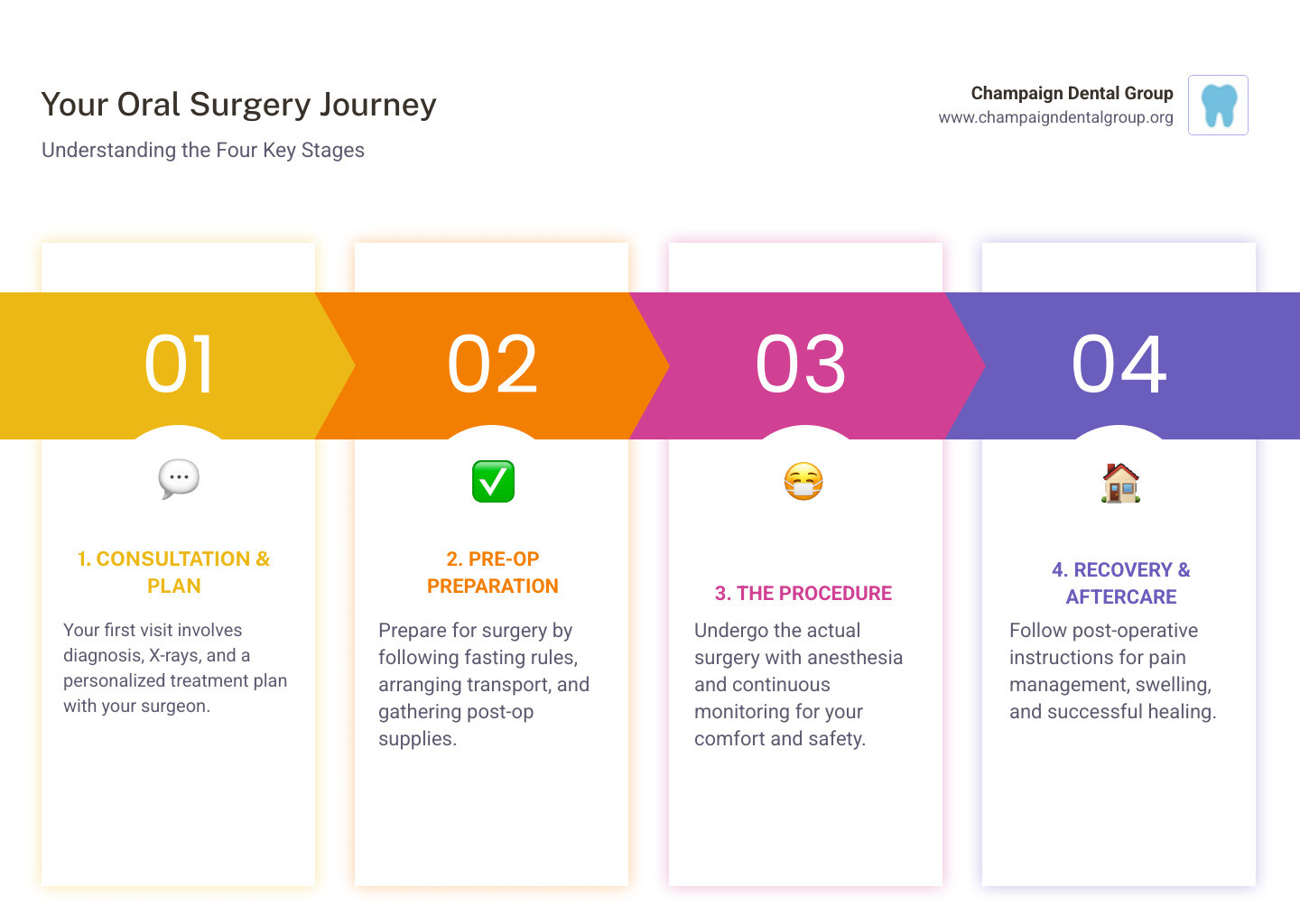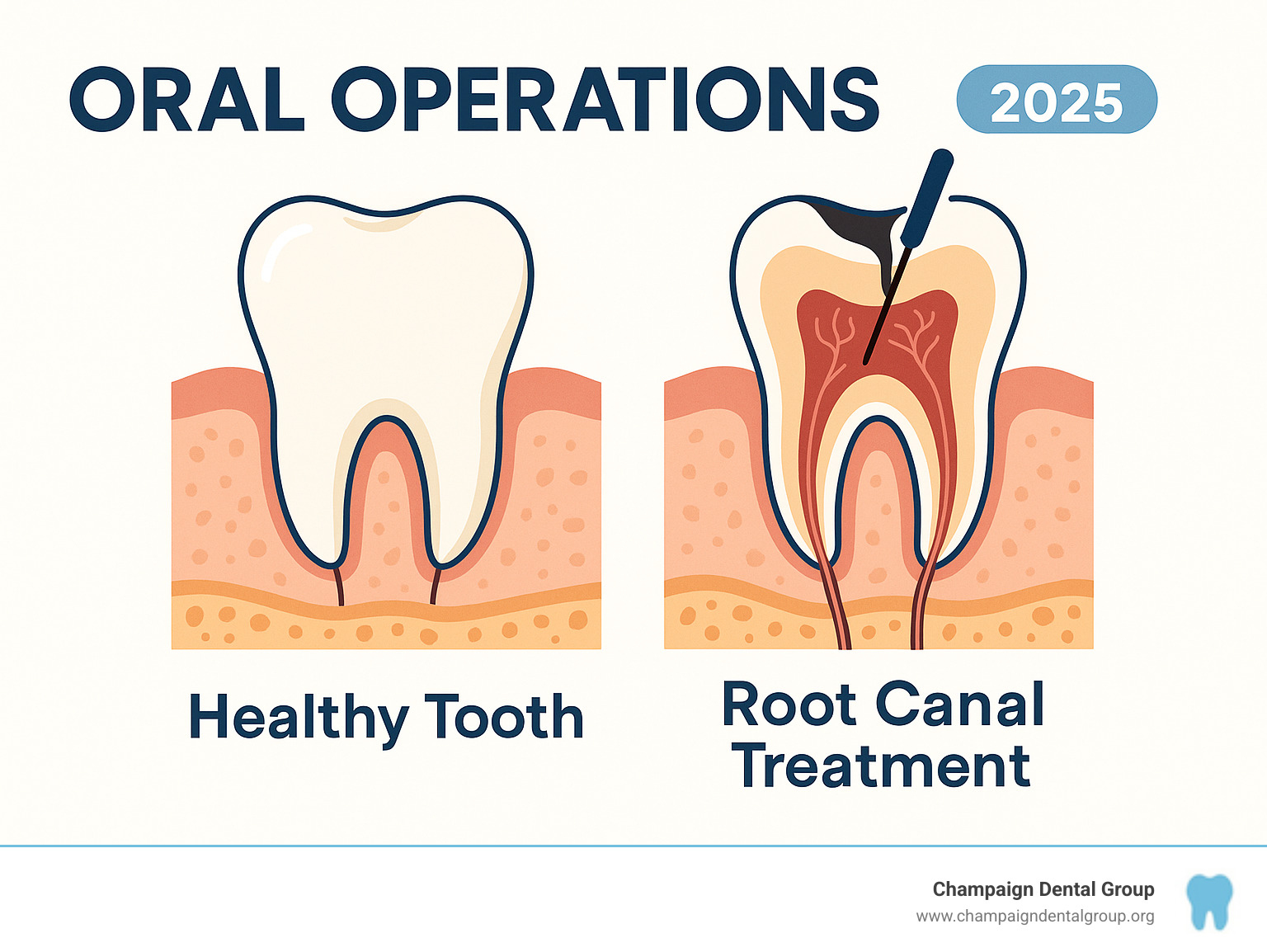The Ins and Outs of Oral Operations (Without the Jargon)

Understanding Oral Surgery: A Parent's Guide to Dental Procedures
Oral operations are surgical procedures performed in your mouth to treat various dental and oral health conditions. If the thought of oral surgery makes you anxious, you're not alone. For busy parents, understanding what these procedures involve is the first step toward feeling confident about your family's dental care.
What oral operations include:
- Tooth extractions - removing damaged or impacted teeth
- Wisdom teeth removal - addressing overcrowding or infection
- Dental implants - replacing missing teeth with permanent solutions
- Root canal therapy - saving infected teeth
- Gum surgery - treating periodontal disease
- Bone grafting - rebuilding jaw bone for implants
The good news is that modern oral surgery is safer and more comfortable than ever. With proper anesthesia, most patients feel little to no pain. At Champaign Dental Group, our compassionate team uses advanced technology to provide the highest quality care.
This guide will walk you through everything you need to know, from why a procedure is needed to what recovery looks like. We'll skip the jargon and focus on practical information to help you make informed decisions for your family. Most people feel better within 2-3 days after oral surgery, though complete healing can take several weeks.

Oral operations vocabulary:
What is Oral Surgery and Who Performs It?
Oral surgery refers to any surgical procedure inside your mouth to treat issues with teeth, gums, or your jaw. It's the next level of dental care when standard treatments aren't enough. While oral surgery focuses on procedures within a dental office, maxillofacial surgery addresses more complex issues of the face, jaw, and neck. Both specialists undergo extensive training, ensuring you're in expert hands.
Who performs these procedures? While a general dentist can handle simple extractions, complex oral operations require an oral and maxillofacial surgeon. These specialists complete an additional 4-6 years of surgical training after dental school, totaling 12-14 years of education to become experts in their field. You can learn more about oral surgeon training and qualifications to understand their expertise.
Why might you need oral surgery? Common reasons include:
- Extensive tooth decay beyond what a filling or crown can fix.
- Impacted teeth, like wisdom teeth, that cause pain or infection.
- Facial trauma from accidents that requires surgical repair.
- Missing teeth that need dental implants to restore function.
- Bone loss in the jaw that requires grafting.
- Oral cancer or other serious conditions requiring intervention.
The benefits of oral operations extend beyond fixing the immediate problem, leading to:
- Pain relief by eliminating the source of discomfort.
- Improved function for eating, speaking, and smiling.
- Improved aesthetics and confidence in your appearance.
- Better overall health by preventing the spread of oral infections.
At Champaign Dental Group, we know the thought of surgery can be overwhelming. Our compassionate team explains every step to ensure you feel comfortable and informed. Since 1997, we've served Champaign families with state-of-the-art technology and personalized care that makes all the difference.
Common Types of Oral Operations Explained

When we talk about oral operations, we're referring to a variety of procedures designed to restore your oral health. Think of them as tools in our dental toolkit, each serving a unique purpose. Our team at Champaign Dental Group is here to guide you through every step with compassionate care.
Tooth Extractions
Sometimes, extraction is the healthiest option. A simple extraction is for a visible tooth, while a surgical extraction is for a tooth that is broken or hasn't fully erupted. Reasons for extraction include severe tooth decay, advanced gum disease, or crowded teeth. If you have severe pain, you might need an emergency molar removal. Our team provides comprehensive Tooth Extractions Services with a focus on your comfort.
Wisdom Teeth Removal
Wisdom teeth, or third molars, often appear between ages 17-21. Many mouths don't have enough room, causing them to become impacted. This can lead to pain and infection or damage to adjacent teeth. Removing problematic wisdom teeth is a preventive measure that protects your long-term oral health. We provide detailed Wisdom Teeth Removal Care Tips for a smooth recovery.
Dental Implants
For missing teeth, dental implants are a oral operation. A titanium post is surgically placed into your jawbone, acting as an artificial root. This post integrates with your natural jaw bone, creating a stable foundation that looks and feels like a natural tooth. The advantages of dental implants include better chewing, clearer speech, and restored confidence. We offer comprehensive Dental Implants Services using state-of-the-art technology.
Root Canal Therapy
Root canal therapy is an oral operation designed to save your natural tooth. When the inner tooth pulp becomes infected due to deep decay or trauma, it can cause severe pain. During the procedure, we remove the infected pulp, clean the inside of the tooth, and seal it. This infection removal process prevents the need for extraction. Our team provides gentle Root Canal Services and will help you prepare for root canal surgery.
Other Specialized Oral Operations
- Bone grafting rebuilds the jawbone to support a dental implant.
- Gum grafts treat receding gums, cover exposed roots, and reduce sensitivity.
- Oral biopsies involve taking a small tissue sample to diagnose conditions like oral cancer.
- Cleft lip and palate repair is a reconstructive surgery for a common birth defect, improving a child's ability to eat and speak.
At Champaign Dental Group, our experienced team is committed to making your experience as comfortable and successful as possible.
Preparing for Your Procedure and Managing Pain

Proper preparation can make your oral operation experience manageable rather than overwhelming. At Champaign Dental Group, we've helped families through these procedures since 1997, and we know that informed patients are relaxed patients. Your pre-operative consultation is your roadmap to success, where our compassionate team will tailor an approach to your specific needs.
How to Prepare for Your Oral Operation
A little planning goes a long way. Your specific steps will depend on your procedure, but these preparations will set you up for success.
- Follow your pre-op checklist: We provide detailed, written instructions custom to your procedure.
- Adhere to fasting guidelines: For your safety, you must avoid eating or drinking for several hours before receiving sedation or general anesthesia.
- Arrange transportation: If you're receiving sedation, you must have someone drive you home. You will not be able to drive.
- Plan time off: You may need a day to a week off from work or school. We'll help you understand what to expect so you can plan accordingly.
- Stock soft foods: Have yogurt, soup, mashed potatoes, and scrambled eggs ready for your recovery.
- Pick up prescriptions: Have any prescribed pain medication or antibiotics ready at home before your procedure.
Pain and Anxiety Management During and After Surgery
Managing your comfort is our specialty. During your oral operation, you have several options to stay comfortable and pain-free.
- Local anesthesia numbs the specific area where we're working.
- IV sedation creates a deeply relaxed, dream-like state. Many patients have little to no memory of the procedure. The benefits of sedation dentistry can transform your relationship with dental care.
- General anesthesia renders you completely unconscious for the most extensive procedures.
After surgery, some discomfort is normal as the anesthesia wears off, usually peaking in the first 24-48 hours. We'll provide a plan for post-op pain medication, often starting with a prescription for the first few days. Over-the-counter options like ibuprofen can manage lingering soreness.
What sets Champaign Dental Group apart is our compassionate care. Our staff is here for you every step of the way, providing detailed instructions, checking on your progress, and answering questions during your healing. Our commitment to high-quality patient care means you're never alone in your recovery.
The Road to Recovery: What to Expect After Surgery
Once your oral operation is complete, the recovery phase begins. This is crucial for proper healing and preventing complications. While everyone heals differently, understanding what to expect can make the process smoother. Our team at Champaign Dental Group provides thorough post-operative instructions because we believe exceptional patient care extends well beyond the procedure.
Your Post-Operative Care Checklist

Following these guidelines will promote a smoother recovery.
- Rest: Avoid strenuous activity for at least 48 hours to allow your body to heal.
- Lift your head: Use two pillows for the first few days to minimize swelling.
- Manage bleeding: Some oozing is normal for 24 hours. Use gauze with firm, constant pressure as instructed. For more tips, see our guide on how to stop bleeding after tooth extraction.
- Control swelling: Use an ice pack for the first 24 hours (10 minutes on, 10 off). After that, switch to warm compresses to ease stiffness.
- Practice gentle oral hygiene: You can usually resume brushing the next day, but be very careful around the surgical site. After 24 hours, rinse gently with warm salt water.
- Eat soft foods: Stick to a soft diet for the first few days. This guide on soft foods to eat after oral surgery has great ideas.
- Avoid straws and smoking: Suction from straws can dislodge the protective blood clot. Why smoking impacts recovery is significant; it hinders healing and increases infection risk.
Understanding Potential Risks and Complications of Oral Operations
While oral operations are very safe, it's important to be aware of rare potential risks. Our team takes every precaution to minimize them, as surgeons work to prevent infections. Potential complications include infection, dry socket (a painful condition if the blood clot dislodges), rare nerve damage, and excessive bleeding or swelling.
Contact our office immediately if you experience warning signs like a fever over 102°F (38.9°C), severe pain not relieved by medication, or excessive bleeding. We are always here to address your concerns.
Typical Recovery Timelines
Recovery time varies by procedure. Less invasive procedures like a simple extraction may take about a week, with you feeling mostly normal in 2-3 days. More invasive procedures like bone grafting require several weeks for full recovery.
- Swelling: Peaks at 2-3 days and subsides over 5-7 days.
- Bruising: Can last up to 10 days.
- Jaw soreness: May last 7-10 days. Gentle massage and soft foods help.
Frequently Asked Questions about Oral Operations
We understand that facing an oral operation brings up questions, and we're here to provide straightforward answers. Our team at Champaign Dental Group believes informed patients are more comfortable patients.
Will my oral operation hurt?
This is the most common question we hear. During the actual oral operation, you will not feel pain. We use effective anesthesia—from local anesthesia to IV sedation or general anesthesia—to ensure your comfort.
Afterward, some soreness is normal as the anesthesia wears off, typically peaking in the first 24 to 48 hours. We will provide prescription medication for the initial discomfort, and many patients find that over-the-counter relief options work well for any lingering soreness. Our compassionate team is committed to managing your comfort throughout the entire process.
How long will the procedure take?
The duration of your oral operation depends on its complexity. We know planning your day is important, especially for busy parents.
A simple extraction may take about 30 minutes. Root canal therapy is often done in one or two appointments. More complex procedures like dental implant placement can take several hours or require multiple visits over several months. We will provide a realistic time estimate during your consultation so you can make arrangements.
Is oral surgery expensive?
The cost of oral operations varies based on the procedure's complexity. We understand cost is a major consideration for families and are committed to making care accessible.
Many dental insurance coverage plans help cover medically necessary procedures. Our administrative team works to maximize your benefits. For costs not covered by insurance, we offer affordable care options. CareCredit for dental procedures offers flexible payment plans, and our own Smile Protection Plan is designed to make comprehensive care more accessible for patients in Urbana and Champaign County. We will always discuss costs upfront and help you find a solution that fits your budget.
Conclusion: Taking the Next Step Towards a Healthier Smile
We hope this guide has clarified what oral operations involve and eased any concerns. Addressing dental issues is an investment in your long-term health and happiness. When you treat pain or replace a missing tooth, you improve your ability to eat, speak, and smile with confidence, which positively impacts your overall well-being.
Choosing the right team makes all the difference. At Champaign Dental Group, we've been part of the Urbana and Champaign County community since 1997. Our highly qualified team combines advanced training with genuine compassion, ensuring you feel supported throughout your entire journey. We use state-of-the-art technology to provide safer, more comfortable, and more effective treatment, from digital imaging to advanced pain management.
Our commitment to compassionate care is at the heart of everything we do. We take the time to answer your questions, explain each step, and provide ongoing support during your recovery. We know dental anxiety is real, and we're here to help you feel at ease.
If you're considering an oral operation, don't let uncertainty hold you back. Our team is ready to create a personalized treatment plan that fits your needs and budget. We'll work with your insurance and offer flexible payment options, including our Smile Protection Plan, to make quality care accessible.
Taking the first step toward better oral health doesn't have to be overwhelming. Request an appointment for your consultation with us today, and let's start the conversation about how we can help you achieve a healthier, happier smile.
.jpg)